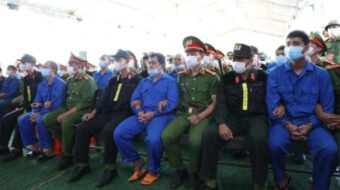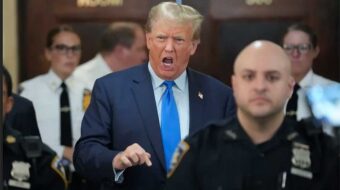Last Friday, a U.S. drone attack targeted and assassinated Anwar al-Awlaki, an American born Al Qaeda leader in Yemen. Al-Awlaki, reportedly an eloquent propagandist for Al Qaeda in English and Arabic, was implicated in attacks on the United States. These attacks included recruiting the “underwear bomber” now on trial for trying to blow up a commercial airliner. He allegedly spoke with, trained and preached to a number of al-Qaeda members and affiliates, including three of the 9/11 hijackers, and Fort Hood shooter Nidal Malik Hasan.
Does, or should, the president have the right to assassinate an American citizen for alleged, but unproven, crimes without any due process at all? No judge was contacted for approval. None of the evidence the government claims to possess about his guilt has been made public, or even given to the Attorney General or any other prosecutor.
White House press secretary Jay Carney could not seem to finish a complete sentence responding to questions about under what authority a U.S. citizen can be assassinated, concluding with “I have nothing more for you.”
It is, admittedly, not the simplest question. And – is it really any different than the big question that confronted us, citizens of the United States, on September 11, 2001 when Al Qaeda-hijacked planes brought down the World Trade Center, crashed into the Pentagon, and in a field in Pennsylvania while headed for the White House? Was this mass murder a crime, or an act of war?
Bush chose act of war, and then criminally launched the so-called “war on terror” – an undefined fraud and power grab which quickly became the opposite of a search for justice and instead a cover for neo-con fantasies about a new world order dominated by U.S. finance and energy monopolies. Two wars, one in Iraq and another in Afghanistan, 1.75 million killed mostly by U.S. forces, inflamed rather than suppressed anti-American sentiments – and thus terror attack risks – throughout the Middle East and the world. Both efforts have been manifest failures by any reasonable standard, a cautionary tale of the dangers of policy that hands unbounded power to the executive branch.
Was there an alternative? Critics of classifying the 9/11 attacks as crimes point to the onerous and uncertain burdens of diplomacy and negotiations with regimes like the Taliban in Afghanistan. The Taliban offered to try Osama bin Laden under Afghan law – assuming they could have really laid hands upon him – but Bush flatly rejected this, clearly already committed to the “war on terror” and reliance on the military to go hunting for a flea with a nuke, so to speak (and seize control of some valuable oil-rich real estate in the bargain).
In hindsight, no doubt the path of a search for criminals instead of a war on terror was complex. But how could it have been worse than what has actually transpired?
So, confronted with the decision to assassinate al-Awlaki, perhaps the president views it as an easier path than respect for a more legal process for bringing a criminal – properly indicted and with a warrant for arrest – to justice. Easier perhaps, but less just, and ultimately not as supportive of the indigenous democratic movement in Yemen struggling against an autocracy – the ultimate foundation of security, and justice for all.












Comments